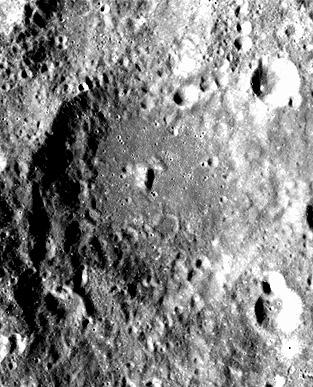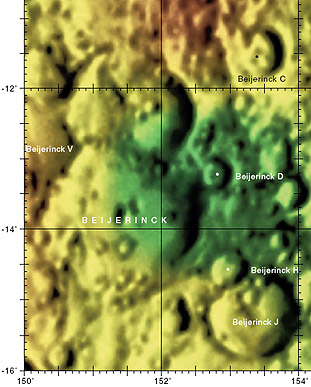Difference between revisions of "Beijerinck"
| Line 5: | Line 5: | ||
|} | |} | ||
[http://www.lpod.org/coppermine/displayimage.php?pid=4173&fullsize=1 [[Image:beijerinck.jpg|beijerinck.jpg]]][[Image:beijerinck-color.jpg|beijerinck-color.jpg]]<br /> (Left) ASU image [http://apollo.sese.asu.edu/data/metric/AS17/png/AS17-M-0696_SML.png AS17-M-0696] from [http://apollo.sese.asu.edu/browse/ Apollo Image Archive], (Right) [http://planetarynames.wr.usgs.gov/images/Lunar/lac_85.pdf Color-coded LAC 85] from [http://planetarynames.wr.usgs.gov/dAtlas.html?map=shaded USGS Digital Lunar Atlas]<br /> <br /> <div id="toc"> | [http://www.lpod.org/coppermine/displayimage.php?pid=4173&fullsize=1 [[Image:beijerinck.jpg|beijerinck.jpg]]][[Image:beijerinck-color.jpg|beijerinck-color.jpg]]<br /> (Left) ASU image [http://apollo.sese.asu.edu/data/metric/AS17/png/AS17-M-0696_SML.png AS17-M-0696] from [http://apollo.sese.asu.edu/browse/ Apollo Image Archive], (Right) [http://planetarynames.wr.usgs.gov/images/Lunar/lac_85.pdf Color-coded LAC 85] from [http://planetarynames.wr.usgs.gov/dAtlas.html?map=shaded USGS Digital Lunar Atlas]<br /> <br /> <div id="toc"> | ||
| − | + | ||
| − | |||
==Images== | ==Images== | ||
[http://www.lpod.org/coppermine/thumbnails.php?album=search&type=full&search=Beijerinck LPOD Photo Gallery] [http://www.lpi.usra.edu/resources/lunar_orbiter/bin/srch_nam.shtml?Beijerinck%7C0 Lunar Orbiter Images] [http://www.lpi.usra.edu/resources/apollo/search/feature/?feature=Beijerinck Apollo Images]<br /> - The oddly shaped '''Beijerinck C''' (to the northeast of '''Beijerinck''' itself) was not photographed during the ''Clementine'' project (all it shows is a black square (a "void"); see page 170 (LAC 85) in the ''Clementine atlas of the Moon''). However, thanks to the mission of Apollo 8, it ('''Beijerinck C''') was 100 percent captured on ''Hasselblad'' frame [http://history.nasa.gov/ap08fj/photos/17-c/med/as08-17-2713.jpg AS8-17-2713].<br /> Research: Danny Caes<br /> HiRes-scan of Apollo 8 photograph: David Woods and Frank O'Brien (''Apollo 8 Flight Journal'').<br /> <br /> | [http://www.lpod.org/coppermine/thumbnails.php?album=search&type=full&search=Beijerinck LPOD Photo Gallery] [http://www.lpi.usra.edu/resources/lunar_orbiter/bin/srch_nam.shtml?Beijerinck%7C0 Lunar Orbiter Images] [http://www.lpi.usra.edu/resources/apollo/search/feature/?feature=Beijerinck Apollo Images]<br /> - The oddly shaped '''Beijerinck C''' (to the northeast of '''Beijerinck''' itself) was not photographed during the ''Clementine'' project (all it shows is a black square (a "void"); see page 170 (LAC 85) in the ''Clementine atlas of the Moon''). However, thanks to the mission of Apollo 8, it ('''Beijerinck C''') was 100 percent captured on ''Hasselblad'' frame [http://history.nasa.gov/ap08fj/photos/17-c/med/as08-17-2713.jpg AS8-17-2713].<br /> Research: Danny Caes<br /> HiRes-scan of Apollo 8 photograph: David Woods and Frank O'Brien (''Apollo 8 Flight Journal'').<br /> <br /> | ||
| Line 27: | Line 26: | ||
<br /> <br /> | <br /> <br /> | ||
---- | ---- | ||
| − | + | </div> | |
Revision as of 16:14, 15 April 2018
Contents
Beijerinck
| Lat: 13.5°S, Long: 151.8°E, Diam: 70 km, Depth: km, Rükl: (farside) |


(Left) ASU image AS17-M-0696 from Apollo Image Archive, (Right) Color-coded LAC 85 from USGS Digital Lunar Atlas
Images
LPOD Photo Gallery Lunar Orbiter Images Apollo Images
- The oddly shaped Beijerinck C (to the northeast of Beijerinck itself) was not photographed during the Clementine project (all it shows is a black square (a "void"); see page 170 (LAC 85) in the Clementine atlas of the Moon). However, thanks to the mission of Apollo 8, it (Beijerinck C) was 100 percent captured on Hasselblad frame AS8-17-2713.
Research: Danny Caes
HiRes-scan of Apollo 8 photograph: David Woods and Frank O'Brien (Apollo 8 Flight Journal).
Maps
(LAC zone 85D4) USGS Digital Atlas PDF
Description
Beijerinck lies just north of 265 km-wide, pre-Nectarian crater, Gagarin. The crater must be very old as most of its rim shows signs of degration that can only be due to age, and the floor is relatively flat, but covered in numerous tiny, pit-like craters. Its innner rim has formed into collapsed platforms, again very worn, and several craters larger than 5 km that show signs of age also cover them. A central peak lies within Beijerinck, but this too appears worn down from years of exposure.
Description: Wikipedia
Additional Information
Nomenclature
- Named for Martinus Willem Beijerinck (March 16, 1851 – January 1, 1931), a Dutch microbiologist and botanist. He is most famous as the founder of virology. He discovered viruses (after Dimitri_Ivanovski in 1892), by proving in filtration experiments that the tobacco mosaic disease is caused by something smaller than a bacterium. He named that new pathogen virus. Beijerinck invented the enrichment culture, a fundamental method of studying microbes from the environment.
- Beijerinck was among the long list of farside names approved by the IAU in 1970 and published in Menzel, 1971.
- In the planning for Apollo 8, the first manned circumlunar mission (1968), this crater (which did not then have an official name) was referred to informally as "Paine" (source: Phil Stooke's LPOD).
LPOD Articles
Bibliography